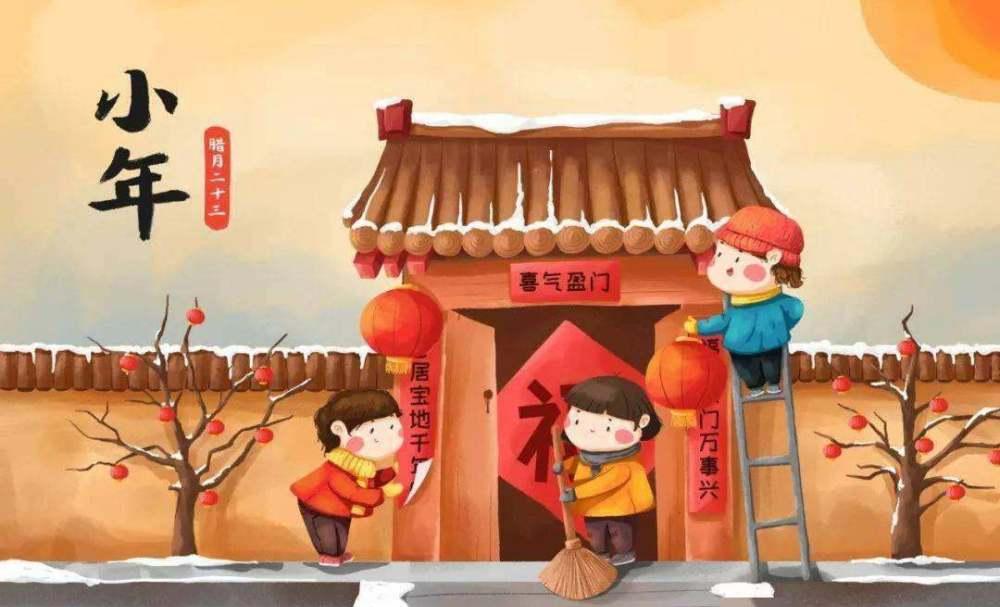Chinese culture is broad and profound, has a long history, and is all-encompassing, and one of the branches is the colloquialism. As the saying goes, it is a kind of summary of the daily production and life of the ancients, which originates from life, acts on life, and involves a wide range of fields.

Today is the twenty-third day of the lunar month, in the traditional festival, it is the "small year", there is a saying: "after the small year, busy with the New Year", this saying is easy to understand, concise and meaningful, it means that after the small year, you will start to prepare for the big year, the so-called big year, is the Spring Festival.
Spring Festival is a traditional festival with a long history, according to the data records, the Chinese nation has a history of more than 4,000 years during the Spring Festival. The Spring Festival is also the most popular traditional festival, and of course the most solemn.
With the arrival of the Spring Festival, the taste of the New Year is getting heavier and heavier, and in a broad sense, there are two ways to say that the Lunar New Year covers the time. One theory is that it is the eighth day of the first lunar month, that is, the eighth festival of Lapa begins to be counted until the Lantern Festival on the fifteenth day of the first month. Therefore, there is also a saying: "Children and children, don't be hungry, after the eighth year is the year"
Another theory is that it can be counted from the beginning of the "small year", that is, the twenty-third or twenty-fourth day of the Waxing Moon, until the Lantern Festival.
Why is there a difference between the 23rd and 24th lunar months, and whether there is a difference between the two?
Xiaonian, in the Northern Song Dynasty, was called "Jiaonian Festival", and in the Southern Song Dynasty, it was renamed "Xiaojie Night", of course, in history, Xiaonian also had other titles, such as "busy year", "small year late" and so on. Before the Ming and Qing dynasties, the small time was set on the twenty-fourth day of the Waxing Moon, and after the Ming and Qing Dynasties, the Northern Region changed the Small Year to the Twenty-third Lunar Month, while the Southern Part was still set at the Twenty-fourth Lunar Month.
Therefore, the 23rd day of the Waxing Moon is also called the "Northern Small Year", and the 24th Waxing Moon is also called the "Southern Small Year"
It is worth noting that the small year is also the birthday of the king of the stove, so it is also called the "Stove God Festival" or "Sacrifice Stove Festival", as the saying goes, the people take food as the sky, "stove." Create also, create food also. In ancient times, almost every household placed the god of the stove on the north or east side of the kitchen.
According to ancient records, during the small New Year, the stove king should go to the immortal world to report to the immortal world, because the stove king is considered to be a complex god who supervises the good and evil of the mortal world, and he also conveys the information of the immortal world and the mortal world.
These are some of the introductions to the traditional festival "Little Year".
Looking back at this saying: "After the small year, busy new year", the end of the small year proves that the time is Chinese New Year's Eve, the time of the first day of the New Year is closer, and people begin to get busy for the big year.
There are also two traditional customs in the small year, one of which is the "dust sweeping day", every household begins to clean the house, clean up the dust, such as the cobwebs accumulated in the corner of the wall for a year, etc., another meaning of cleaning the dust is to prepare to leave the old and welcome the new.
In addition, the folk also say: "twenty-three, sugar melon sticky", some places will make a kind of sweets, known as "sugar melon", because it is used to worship the king of the stove, so this sweet food is also called "stove sugar", as mentioned above, the king of the stove in the small year to go to heaven to report to the duty, the reason for offering tang melon, people think that let the king of the stove eat sweets, the heavenly first jade emperor said good things.
Of course, there are different winds in ten miles, different customs in a hundred miles, and different places have slightly different ways of celebrating the customs of the little year. On the day of the New Year, the media believed that there were no taboos, because the saying also said: "The gods have gone to heaven, and there are no taboos."
Happy New Year and Happy New Year.